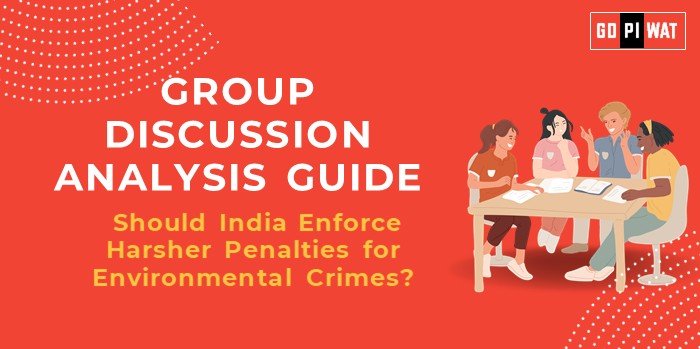📋 Group Discussion (GD) Analysis Guide: Should India Enforce Harsher Penalties for Environmental Crimes?
🌐 Introduction to the Topic
Opening Context: Environmental crimes—such as illegal mining, deforestation, and industrial pollution—cause irreversible damage to ecosystems and public health, costing India billions annually. Given the global focus on sustainability, stricter penalties for these offenses are being debated as an urgent necessity.
Background: India’s environmental laws date back to the 1970s, with the Environment Protection Act (1986) being the cornerstone. However, enforcement is often weak, resulting in recurring violations. Global trends emphasize stricter legal frameworks and penalties to curb environmental degradation.
📊 Quick Facts and Key Statistics
- Deforestation Loss: India lost 668,400 hectares of forest between 2015–2023 (FAO, 2023).
- Air Pollution Impact: Estimated 1.6 million deaths annually in India due to air pollution (Lancet, 2023).
- Industrial Violations: CPCB flagged over 3,000 industries for violating environmental standards in 2022.
- Economic Cost: Environmental degradation costs India 5.7% of GDP annually (World Bank, 2022).
👥 Stakeholders and Their Roles
- Government Agencies: Implement policies, conduct audits, and enforce penalties.
- Corporates: Comply with environmental norms and adopt sustainable practices.
- NGOs: Monitor violations and advocate for policy changes.
- Citizens: Raise awareness and demand accountability.
- Judiciary: Ensure justice through verdicts that set deterrents.
✨ Achievements and Challenges
Achievements
- Amendments to Wildlife Protection Act (2022) strengthened animal protection.
- Creation of National Green Tribunal for speedy resolution of environmental cases.
- Maharashtra: Reduction in industrial emissions by 15% in 2023 through stricter monitoring.
Challenges
- Weak enforcement due to corruption and lack of resources.
- Lack of coordination between state and central agencies.
- Examples: Amazon deforestation fines in Brazil show similar enforcement difficulties globally.
📚 Structured Arguments for Discussion
- Supporting Stance: “Enforcing harsher penalties for environmental crimes is crucial to deter offenders and protect public health.”
- Opposing Stance: “While stricter penalties are essential, inadequate enforcement mechanisms may render them ineffective.”
- Balanced Perspective: “Stricter penalties, coupled with better enforcement and public participation, can lead to significant improvements.”
📝 Effective Discussion Approaches
- Opening Approaches:
- Data Start: “India loses 5.7% of its GDP annually to environmental damage. Can we afford this neglect?”
- Global Comparison: “Countries like Norway levy fines up to $10 million per offense. India’s penalties pale in comparison.”
- Counter-Argument Handling:
- Highlight examples of countries with strict laws and better compliance (e.g., Germany).
- Emphasize the role of technology in monitoring and enforcement.
🔍 Strategic Analysis of Strengths and Weaknesses
Strengths
- Global advocacy for climate action.
- Judicial support for environmental protection.
Weaknesses
- Poor funding for enforcement bodies.
- Low public awareness about environmental laws.
Opportunities
- Leverage AI for monitoring violations.
- Attract green investments through compliance incentives.
Threats
- Lobbying by industries against stricter laws.
- Economic pushback on compliance costs.
📈 Connecting with B-School Applications
- Real-World Applications:
- Case study projects on environmental compliance.
- Research on economic impacts of green regulations.
- Sample Interview Questions:
- “How can stricter penalties improve corporate accountability in India?”
- “What role can technology play in monitoring environmental compliance?”
- Insights for B-School Students:
- Understanding ESG compliance for corporate strategy.
- Exploring sustainable development as a core business practice.


